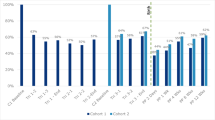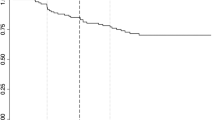Abstract
We sought to determine clinical predictors of postpartum depression (PPD), including the role of medication, in a sample of women followed prospectively during and after pregnancy. Women with a history of mood disorder were recruited and evaluated during each trimester and 1 week, 1 month, and 3 months postpartum. DSM-IV criteria for a major depressive episode were assessed by a psychiatric interview at each time point. Sixty-three women with major depression and 30 women with bipolar disorder entered the study and 75.4 % met DSM-IV criteria for a MDE during pregnancy, postpartum, or both. We modeled depression in a given time period (second trimester, third trimester, or 1 month postpartum) as a function of medication use during the preceding period (first, second, or third trimester). The odds of being depressed for those who did not use medication in the previous period was approximately 2.8 times that of those who used medication (OR 2.79, 95 % CI 1.38–5.66, p = 0.0048). Of 38 subjects who were psychiatrically well during the third trimester, 39.5 % (N = 15) met the criteria for a MDE by 4 weeks postpartum. In women who developed PPD, there was a high rate of a family history of PPD (53.3 %) compared to women who did not develop PPD (11.8 %, p = 0.02). While the use of psychiatric medications during pregnancy reduced the odds of being depressed overall, the use of psychiatric medications during pregnancy may not protect against PPD in women at high risk, particularly those with a family history of PPD.



Similar content being viewed by others
References
Akman I, Kuscu K, Ozdemir N, Yurdakul Z, Solakoglu M, Orhan L, Karabekiroglu A, Ozek E (2006) Mothers’ postpartum psychological adjustment and infantile colic. Arch Dis Child 91(5):417–419
Bloch M, Schmidt PJ, Danaceau M, Murphy J, Nieman L, Rubinow DR (2000) Effects of gonadal steroids in women with a history of postpartum depression. Am J Psychiatry 157(6):924–930
Bratfos O, Hang JO (1966) Puerperal mental disorders in manic depressive females. Acta Psychiatr Scand 42:285–294
Campbell SB, Cohn JF (1992) Prevalence and correlates of postpartum depression in first-time mothers. J Abnorm Psychol 100(4):594–599
Cohen LS, Nonacs RM, Bailey JW, Viguera AC, Reminick AM, Altshuler LL, Stowe ZN, Faraone SV (2004) Relapse of depression during pregnancy following antidepressant discontinuation: a preliminary prospective study. Arch Women Mental Health 7(4):217–221
Cohen LS, Altshuler LL, Harlow BL, Nonacs R, Newport DJ, Viguera AC, Suri R, Burt VK, Hendrick V, Reminick AM, Loughead A, Vitonis AF, Stowe ZN (2006) Relapse of major depression during pregnancy in women who maintain or discontinue antidepressant treatment. JAMA 295(5):499–507
Cox JL, Murray D, Chapman G (1993) A controlled study of the onset, duration and prevalence of postnatal depression. Br J Psychiatry 163:27–31
Davidson J, Robertson E (1985) A follow-up study of postpartum illness. Acta Psychiatr Scand 71:451–457
Dean C, Williams RJ, Brockington IF (1989) Is puerperal psychosis the same as bipolar manic-depressive disorder? A family study. Psychol Med 19:637–647
Dietz PM, Williams SB, Callaghan WM, Bachman DJ, Whitlock EP, Hornbrook MC (2007) Clinically identified maternal depression before, during, and after pregnancies ending in live births. Am J Psychiatr 164(10):1515–1520
Field T (2011) Prenatal depression effects on early development: a review. Infant Behav Dev 34(1):1–14
Flynn HA, Davis M, Marcus SM, Cunningham R, Blow FC (2004) Rates of maternal depression in pediatric emergency department and relationship to child service utilization. Gen Hosp Psychiatry 26(4):316–322
Forty L, Jones L, Macgregor S, Caesar S, Cooper C, Hough A, Dean L, Dave S, Farmer A, McGuffin P, Brewster S, Craddock N, Jones I (2006) Familiality of postpartum depression in unipolar disorder: results of a family study. Am J Psychiatry 163(9):1549–1553
Frank E, Kupfer DJ, Jacob M, Blumenthal SJ, Jarrett DB (1987) Pregnancy-related affective episodes among women with recurrent depression. Am J Psychiatry 144(3):288–293
Grace SL, Evindar A, Stewart DE (2003) The effect of postpartum depression on child cognitive development and behavior: a review and critical analysis of the literature. Arch Women Mental Health 6(4):263–274
Guintivano J, Arad M, Gould TD, Payne JL, Kaminsky ZA (2013) Antenatal prediction of postpartum depression with blood DNA methylation biomarkers. Molecular Psych 1-8. doi: 10.1038/mp.2013.62
Jones I, Craddock N (2001) Familiality of the puerperal trigger in bipolar disorder: results of a family study. Am J Psychiatry 158(6):913–917
Jones I, Middle F, McCandless F, Coyle N, Robertson E, Brockington I, Lendon C, Craddock N (2000) Molecular genetic studies of bipolar disorder and puerperal psychosis at two polymorphisms in the estrogen receptor alpha gene (ESR 1). Am J Med Genet 96(6):850–853
Jones I, Hamshere M, Nangle JM, Bennett P, Green E, Heron J, Segurado R, Lambert D, Holmans P, Corvin A, Owen M, Jones L, Gill M, Craddock N (2007) Bipolar affective puerperal psychosis: genome-wide significant evidence for linkage to chromosome 16. Am J Psychiatry 164(7):1099–1104
Kendell RE, Chalmers JC, Platz C (1987) Epidemiology of puerperal psychoses. Br J Psychiatry 150:662–673
Mahon PB, Payne JL, MacKinnon DF et al (2009) Genome-wide linkage and follow-up association study of postpartum mood symptoms. Am J Psychiatry 166(11):1229–1237
Marcus SM (2009) Depression during pregnancy: rates, risks and consequences—Motherisk Update 2008. Can J Clin Pharmacol 16(1):e15–e22
Misri S, Eng A, Abizadeh J, Blackwell E, Spidel A, Oberlander T (2013) Factors impacting decisions to decline or adhere to antidepressant medication in perinatal women with mood and anxiety disorders. Depress Anxiety 30(11):1129–1136
Murphy-Eberenz K, Zandi PP, March D et al (2006) Is perinatal depression familial? J Affect Disord 90(1):49–55
O'hara MW (2009) Postpartum depression: what we know. J Clin Psychol 65(12):1258–1269
Payne JL, Roy PS, Murphy-Eberenz K, Weissman MM, Swartz KL, McInnis MG, Nwulia E, Mondimore FM, MacKinnon DF, Miller EB, Nurnberger JI, Levinson DF, DePaulo JR, Potash JB (2007) Reproductive cycle-associated mood symptoms in women with major depression and bipolar disorder. J Affect Disord 99:221–229
Payne JL, MacKinnon DF, Mondimore FM et al (2008) Familial aggregation of postpartum mood symptoms in families with bipolar disorder. J Bipolar Disord 10(1):38–44
Reich T, Winokur (1970) Postpartum psychosis in patients with manic depressive disease. J Nerv Merit Dis 151:60–68
Shadigian E, Bauer ST (2005) Pregnancy-associated death: a qualitative systematic review of homicide and suicide. Obstet Gynecol Surv 60(3):183–190
Shivakumar G, Johnson NL, McIntire DD, Leveno K (2013) Progression of major depression during pregnancy and postpartum: a preliminary study. J Matern Fetal Neonatal Med. doi:10.3109/14767058.2013.825599
Sichel DA, Cohen LS, Robertson LM, Ruttenberg A, Rosenbaum JF (1995) Prophylactic estrogen in recurrent postpartum affective disorder. Biol Psychiatry 38(12):814–818
Sit DK, Perel JM, Helsel JC, Wisner KL (2008) Changes in antidepressant metabolism and dosing across pregnancy and early postpartum. J Clin Psychiatry 69(4):652–658
Spinelli MG (2004) Maternal infanticide associated with mental illness: prevention and the promise of saved lives. Am J Psychiatry 161(9):1548–1557
Viguera AC, Tondo L, Koukopoulos AE, Reginaldi D, Lepri B, Baldessarini RJ (2011) Episodes of mood disorders in 2,252 pregnancies and postpartum periods. Am J Psychiatry 168(11):1179–1185
Wisner KL, Wheeler SB (1994) Prevention of recurrent postpartum major depression. Hosp Community Psychiatry 45(12):1191–1196
Wisner KL, Perel JM, Peindl KS, Hanusa BH, Findling RL, Rapport DJ (2001) Prevention of recurrent postpartum depression: a randomized clinical trial. J Clin Psychiatry 62:82–86
Wisner KL, Perel JM, Peindl KS, Hanusa BH, Piontek CM, Findling RL (2004) Prevention of recurrent postpartum depression: a pilot randomized clinical trial. Am J Psychiatry 161:1290–1292
Yonkers KA, Ramin SM, Rush AJ, Navarrete CA, Carmody T, March D, Heartwell SF, Leveno KJ (2001) Onset and persistence of postpartum depression in an inner-city maternal health clinic system. Am J Psychiatry 158(11):1856–1863
Yonkers KA, Gotman N, Smith MV, Forray A, Belanger K, Brunetto WL, Lin H, Burkman RT, Zelop CM, Lockwood CJ (2011) Does antidepressant use attenuate the risk of a major depressive episode in pregnancy? Epidemiology 22(6):848–854
Conflict of interest
Dr. Payne has received research support from Corcept Pharmaceuticals in the past year and legal consulting fees from Pfizer, Johnson and Johnson, and Astra Zeneca. Dr. Meltzer-Brody has received research support from Astra Zeneca. This study was funded by NIH Grant K23 MH074799 at the Johns Hopkins site and by the Foundation of Hope for the University of North Carolina site.
Ethical statement
The study was approved by the Johns Hopkins IRB. All participants gave written informed consent prior to participation in the study.
Author information
Authors and Affiliations
Corresponding author
Rights and permissions
About this article
Cite this article
Kimmel, M., Hess, E., Roy, P.S. et al. Family history, not lack of medication use, is associated with the development of postpartum depression in a high-risk sample. Arch Womens Ment Health 18, 113–121 (2015). https://doi.org/10.1007/s00737-014-0432-9
Received:
Accepted:
Published:
Issue Date:
DOI: https://doi.org/10.1007/s00737-014-0432-9




